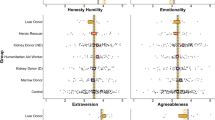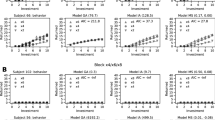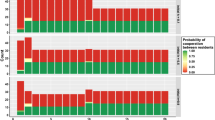Abstract
We donate billions to charities each year, yet much of our giving is ineffective. Why are we motivated to give but not to give effectively? Building on evolutionary game theory, we argue that donors evolved (genetically or culturally) to be insensitive to efficacy because people tend not to reward efficacy, as social rewards tend to depend on well-defined and highly observable behaviours. We present five experiments testing key predictions of this account that are difficult to reconcile with alternative accounts based on cognitive or emotional limitations. Namely, we show that donors are more sensitive to efficacy when helping (1) themselves or (2) their families. Moreover, (3) social rewarders don’t condition on efficacy or other difficult-to-observe behaviours (4, 5), such as the amount donated.
This is a preview of subscription content, access via your institution
Access options
Access Nature and 54 other Nature Portfolio journals
Get Nature+, our best-value online-access subscription
$29.99 / 30 days
cancel any time
Subscribe to this journal
Receive 12 digital issues and online access to articles
$119.00 per year
only $9.92 per issue
Buy this article
- Purchase on Springer Link
- Instant access to full article PDF
Prices may be subject to local taxes which are calculated during checkout




Similar content being viewed by others
Data availability
The data that support the findings reported in this paper are available from the corresponding author upon request.
References
Baron, J. & Greene, J. Determinants of insensitivity to quantity in valuation of public goods: contribution, warm glow, budget constraints, availability, and prominence. J. Exp. Psychol. Appl. 2, 107–125 (1996).
Kahneman, D., Ritov, I., Schkade, D., Sherman, S. J. & Varian, H. R. Economic preferences or attitude expressions? An analysis of dollar responses to public issues. J. Risk Uncertain. 19, 203–235 (1999).
Berman, J. Z., Barasch, A., Levine, E. E. & Small, D. A. Impediments to effective altruism: the role of subjective preferences in charitable giving. Psych. Sci. 29, 834–844 (2018).
Giving USA: The Annual Report on Philanthropy for the Year of 2015 (Giving USA Foundation, 2016).
Volunteering in the United States, 2015 Economic News Release (Bureau of Labor Statistics, US Department of Labor, 2016); https://www.bls.gov/news.release/volun.nr0.htm
Lindsey, D. Who’s raising the most: The 100 charities that are America’s favorites. The Chronicles of Philanthropy https://www.philanthropy.com/article/Who-s-Raising-the-Most-The/244933 (2018).
Top Charities (GiveWell, 2020); https://www.givewell.org/charities/top-charities?utm_expid=.QIUuueagRBqB_qsw6bI8xg.0&utm_referrer=https%3A%2F%2Fwww.google.com%2F
Your Dollar Goes Further Overseas (GiveWell, 2016); https://www.givewell.org/giving101/Your-dollar-goes-further-overseas
Ord, T. The Moral Imperative Toward Cost-Effectiveness in Global Health (Center for Global Development, 2013).
Singer, P. The Most Good You Can Do: How Effective Altruism Is Changing Ideas about Living Ethically (Yale Univ. Press, 2015).
Desvousges, W. H. et al. Measuring Nonuse Damages Using Contingent Valuation: An Experimental Evaluation of Accuracy 2nd edn (RTI International, 1992).
Rondeau, D. & List, J. A. Matching and challenge gifts to charity: evidence from laboratory and natural field experiments. Exp. Econ. 11, 253–267 (2008).
Karlan, D., List, J. A. & Shafir, E. Small matches and charitable giving: evidence from a natural field experiment. J. Public Econ. 95, 344–350 (2011).
Kahneman, D. & Tversky, A. Prospect theory: an analysis of decision under risk. Econometrica 47, 263–291 (1979).
Jenni, K. & Loewenstein, G. Explaining the identifiable victim effect. J. Risk Uncertain. 14, 235–257 (1997).
Small, D. A. & Loewenstein, G. Helping a victim or helping the victim: altruism and identifiability. J. Risk Uncertain. 26, 5–16 (2003).
Bloom, P. Empathy and its discontents. Trends Cogn. Sci. 21, 24–31 (2017).
Andreoni, J. Impure altruism and donations to public goods: a theory of warm-glow giving. Econ. J. 100, 464–477 (1990).
Nowak, M. A. Five rules for the evolution of cooperation. Science 314, 1560–1563 (2006).
Panchanathan, K. & Boyd, R. Indirect reciprocity can stabilize cooperation without the second-order free rider problem. Nature 432, 499–502 (2004).
Hoffman, M, Yoeli, E. & Navarrete, C. D. in The Evolution of Morality (eds Shakelford, T. & Hansen, R.) 289–316 (Springer, 2016).
Nowak, M. A. Evolutionary Dynamics (Harvard Univ. Press, 2006).
Fudenberg, D. & Maskin, E. The folk theorem in repeated games with discounting or with incomplete information. Econometrica 54, 533–554 (1986).
Freitas, J. D., Thomas, K., DeScioli, P. & Pinker, S. Common knowledge, coordination, and strategic mentalizing in human social life. Proc. Natl Acad. Sci. USA 116, 13751–13758 (2019).
DeScioli, P. & Kurzban, R. Mysteries of morality. Cognition 112, 281–299 (2009).
Darwin, C. On the Origin of Species by Means of Natural Selection, or, the Preservation of Favoured Races in the Struggle for Life (P.F. Collier & Son, 1859).
Hamilton, W. D. The evolution of altruistic behavior. Am. Nat. 97, 354–356 (1963).
Henrich, J. The Secret of Our Success: How Culture Is Driving Human Evolution, Domesticating Our Species, and Making Us Smarter (Princeton Univ. Press, 2015).
Barclay, P. Biological markets and the effects of partner choice on cooperation and friendship. Curr. Opin. Psychol. 7, 33–38 (2016).
Gintis, H., Smith, E. A. & Bowles, S. Costly signaling and cooperation. J. Theor. Biol. 213, 103–119 (2001).
Alpizar, F., Carlsson, F. & Johansson-Stenman, O. Anonymity, reciprocity, and conformity: evidence from voluntary contributions to a national park in Costa Rica. J. Public Econ. 92, 1047–1060 (2008).
Kraft-Todd, G., Yoeli, E., Bhanot, S. & Rand, D. Promoting cooperation in the field. Curr. Opin. Behav. Sci. 3, 96–101 (2015).
Goldstein, N. J., Cialdini, R. B. & Griskevicius, V. A room with a viewpoint: using social norms to motivate environmental conservation in hotels. J. Consum. Res. 35, 472–482 (2008).
Hamlin, J. K. & Wynn, K. Young infants prefer prosocial to antisocial others. Cogn. Dev. 26, 30–39 (2011).
Almenberg J., Dreber, A., Apicella, C. L., & Rand, D. G. in Psychology of Punishment (eds Palmetti, N. M. & Russo, J. P.) 73–92 (Nova Publishers, 2011).
McAuliffe, K., Jordan, J. J. & Warneken, F. Costly third-party punishment in young children. Cognition 134, 1–10 (2015).
Fehr, E., Fischbacher, U. & Gächter, S. Strong reciprocity, human cooperation, and the enforcement of social norms. Hum. Nat. 13, 1–25 (2002).
Hamlin, J. K., Wynn, K., Bloom, P. & Mahajan, N. How infants and toddlers react to antisocial others. Proc. Natl Acad. Sci. USA 108, 19931–19936 (2011).
Jordan, J. J., Hoffman, M., Bloom, P. & Rand, D. G. Third-party punishment as a costly signal of trustworthiness. Nature 530, 473–476 (2016).
Raihani, N. J. & Bshary, R. Why humans might help strangers. Front. Behav. Neurosci. 9, 39 (2015).
Alger, I. & Weibull, J. W. Homo moralis—preference evolution under incomplete information and assortative matching. Econometrica 81, 2269–2302 (2013).
Wilson, D. & Sober, E. Reintroducing group selection to the human behavioral sciences. Behav. Brain Sci. 17, 585–608 (1994).
Boyd, R. A Different Kind of Animal: How Culture Transformed Our Species Vol. 46 (Princeton Univ. Press, 2017).
Henrich, J., Heine, S. J. & Norenzayan, A. Most people are not WEIRD. Nature 466, 29 (2010).
Aktipis, A. et al. Cooperation in an uncertain world: for the Maasai of East Africa, need-based transfers outperform account-keeping in volatile environments. Hum. Ecol. 44, 353–364 (2016).
Gurven, M. Tolerated reciprocity, reciprocal scrounging, and unrelated kin: making sense of multiple models. Behav. Brain Sci. 27, 572–579 (2004).
McNamara, R. A., Willard, A. K., Norenzayan, A. & Henrich, J. Weighing outcome vs. intent across societies: how cultural models of mind shape moral reasoning. Cognition 182, 95–108 (2019).
Barrett, H. C. et al. Small-scale societies exhibit fundamental variation in the role of intentions in moral judgment. Proc. Natl Acad. Sci. USA 113, 4688–4693 (2016).
Small, D. A. & Simonsohn, U. Friends of victims: personal experience and prosocial behavior. J. Consum. Res. 35, 532–542 (2008).
DeScioli, P., Bruening, R. & Kurzban, R. The omission effect in moral cognition: toward a functional explanation. Evol. Hum. Behav. 32, 204–215 (2011).
Dana, J., Weber, R. A. & Kuang, J. X. Exploiting moral wiggle room: experiments demonstrating an illusory preference for fairness. Econ. Theory 33, 67–80 (2007).
Andreoni, J., Rao, J. M. & Trachtman, H. Avoiding the Ask: A Field Experiment on Altruism, Empathy, and Charitable Giving Report No. w17648 (National Bureau of Economic Research, 2011).
Dana, J., Cain, D. M. & Dawes, R. M. What you don’t know won’t hurt me: costly (but quiet) exit in dictator games. Organ. Behav. Hum. Decis. Process. 100, 193–201 (2006).
Trivers, R. L. The evolution of reciprocal altruism. Q. Rev. Biol. 46, 35–57 (1971).
Weber, E. U. et al. Asymmetric discounting in intertemporal choice: a query-theory account. Psychol. Sci. 18, 516–523 (2007).
Acknowledgements
We thank E. Yoeli, A. Bear, M. Singh, J. Jordan and P. DeScioli for their feedback on this manuscript; N. Baloch, Y. Mehra Bardoloi, K. Barolak, B, Davis, O. Lala and H. Mullins for their help in calculating and awarding the bonuses; S. Ryan, A. Viser, E. Wilson and P. Choi for their help in formatting the manuscript and editing the figures; and the John Templeton Foundation for financial support. The funders had no role in study design, data collection and analysis, decision to publish or preparation of the manuscript.
Author information
Authors and Affiliations
Contributions
All authors edited the manuscript and approved the final version. B.B. and M.H. designed the studies and wrote the manuscript, in consultation with M.N. B.B. collected and analysed the data. The study designs were based on theory developed by M.H.
Corresponding author
Ethics declarations
Competing interests
The authors declare no competing interests.
Additional information
Peer review information Primary handling editor: Charlotte Payne.
Publisher’s note Springer Nature remains neutral with regard to jurisdictional claims in published maps and institutional affiliations.
Supplementary information
Rights and permissions
About this article
Cite this article
Burum, B., Nowak, M.A. & Hoffman, M. An evolutionary explanation for ineffective altruism. Nat Hum Behav 4, 1245–1257 (2020). https://doi.org/10.1038/s41562-020-00950-4
Received:
Accepted:
Published:
Issue Date:
DOI: https://doi.org/10.1038/s41562-020-00950-4
This article is cited by
-
Kin term mimicry hypothesis
Theory in Biosciences (2023)
-
Validation Analysis of Charitable Organizations and Media Monitoring Using an Evolutionary Model in China
Journal of the Knowledge Economy (2023)
-
Leveraging social cognition to promote effective climate change mitigation
Nature Climate Change (2022)
-
The Dasgupta Review and the Problem of Anthropocentrism
Environmental and Resource Economics (2022)
-
Exposure to COVID-19 is associated with increased altruism, particularly at the local level
Scientific Reports (2021)



